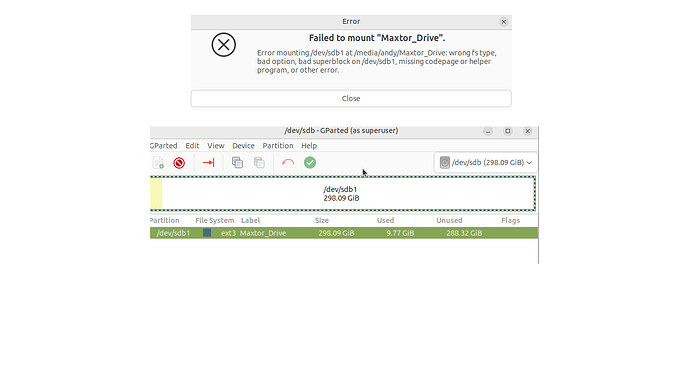It looks like Gparted sees no problem.
I respectfully ask that if you are not very experienced in modifiying fstab,
please do not reply.
Thanks.
# Use 'blkid' to print the universally unique identifier for a
# device; this may be used with UUID= as a more robust way to name devices
# that works even if disks are added and removed. See fstab(5).
#
# <file system> <mount point> <type> <options> <dump> <pass>
# / was on /dev/sda2 during curtin installation
/dev/disk/by-uuid/0595c53a-382c-451c-b880-fcb6f8bbab38 / ext4 defaults 0 1
# /boot/efi was on /dev/sda1 during curtin installation
/dev/disk/by-uuid/53E4-FBFA /boot/efi vfat defaults 0 1
/swap.img none swap sw 0 0
Why am I getting that error message?
Any chance that you tried to mount the ext3 filesystem as a ext4 filesystem ? 
If that was your intent, I know that there is an easy way to convert an ext3 filesystem into an ext4 filesystem, but I don't remember the details.
My best suggestion is to right-click and attempt the "Check" option to see what Gparted is telling you about that partition.
Better yet, use the manual command-line interface version, for more detail, by entering (which will not modify the filesystem)
fsck -N -t ext3 /dev/sdb1 -- -v
If that doesn't give you any insights, try to see what the reported code for filesystem type tells you from entering
gdisk -l /dev/sdb
3 Likes
andy@Custom:~$ fsck -N -t ext3 /dev/sdb1 -- -v
fsck from util-linux 2.39.3
[/usr/sbin/fsck.ext3 (1) -- /dev/sdb1] fsck.ext3 -v /dev/sdb1
Hi, @fixit7
At first glance, I agree with @ericmarceau 's main diagnosis: you have created an ext3 filesystem (with a size of 298 GiB , and that one already has 9.77 GiB of data) in what is now your /dev/sdb1 partition of your /dev/sdb disk BUT, in your /etc/fstab , you do NOT have any mounts for any ext3 filesystem.
If you want to convert that ext3 filesystem in /dev/sdb1 into an ext4 one, the tutorial that @pavlos_kairis has linked to - https://linuxconfig.org/how-to-convert-an-ext3-filesystem-partition-to-ext4 - seems to be a great one.
Could you please post the output of the following command, so we can better understand what disks, partitions, filesystems, UUID you have in your current scenario:
lsblk -o NAME,FSTYPE,FSVER,LABEL,UUID,SIZE,FSUSE%,FSAVAIL,MOUNTPOINT | grep --invert-match '^loop'
2 Likes
I took an empty ssd. Using gparted I created a new partition sdc1, ext3. All went well. I unplugged the ssd and replugged it. Edited my /etc/fstab as:
/dev/sdc1 /media/andy ext3 defaults 0 0
#create mount point
sudo mkdir /media/andy
#mount everything
sudo mount -a
#show
df
/dev/sdc1 76344612 56156 72380976 1% /media/andy
#ric's command
user@um24:~$ lsblk -o NAME,FSTYPE,FSVER,LABEL,UUID,SIZE,FSUSE%,FSAVAIL,MOUNTPOINT | grep --invert-match '^loop'
NAME FSTYPE FSVER LABEL UUID SIZE FSUSE% FSAVAIL MOUNTPOINT
sda 59.6G
└─sda1 ext4 1.0 2d0fd142-62ff-4808-878b-00cd1d9c2375 59.6G 36% 34.5G /
sdb 465.8G
└─sdb1 ext4 1.0 bk db5620de-b5c8-4ec8-8cbf-4f2cd5d3f5ed 465.8G 20% 344.3G /home/user/bk
sdc 74.5G
└─sdc1 ext3 1.0 8b1ce8fb-fa21-4558-b66d-9bcf0106cdd1 74.5G 0% 69G /media/andy
sr0 1024M
all done on um24
3 Likes
